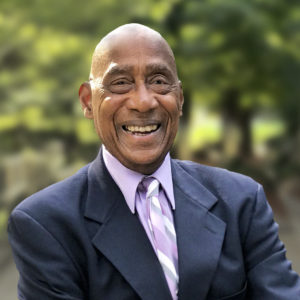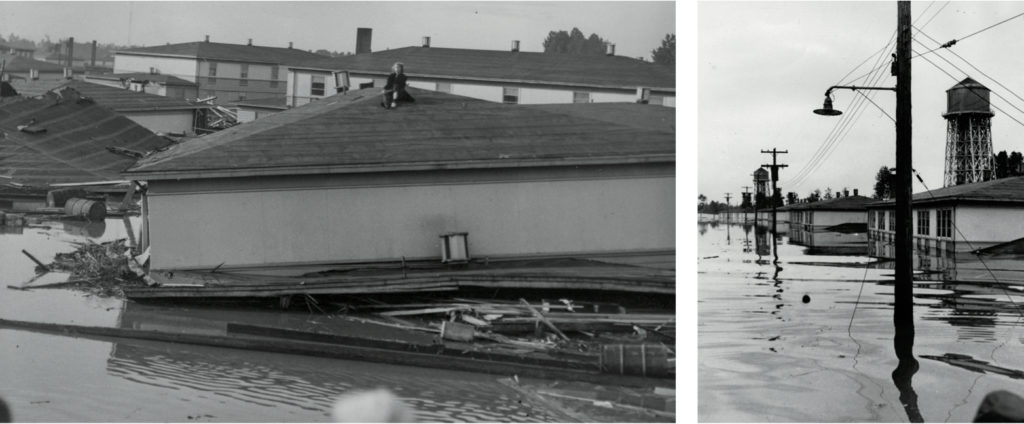Survivor embraced civics early on

By Nancy Varekamp | CNews Editor
Every year, Ed Washington commemorates his family’s escape from the 1948 flood waters that destroyed Vanport. The 84-year-old Concordian spent only four years of his childhood there, but those years helped lay his foundation for embracing education, civil rights and civic engagement.
Ed’s father moved from Birmingham, Alabama, in 1942 for a job with Henry J. Kaiser’s Oregon Shipbuilding Corporation to help fill naval needs during World War II. Two years later, seven-year-old Ed joined his father in Vanport, along with five brothers and a sister and their mother. To this day, he refers to her as “Mother Dear” and credits her respect for family and community for initiating his interest in civic involvement.
Ed has distinct memories of the long train trip to Oregon, and how his family was relieved to spend an 18-hour layover in Chicago with relatives. Quarters on the train were cramped.
When they reached Vanport, the Washingtons found a city of two-story buildings, each with 14 apartments and all connected to central utilities. Medical facilities were also available. In fact, Vanport was one of the 10 West Coast cities with clinics that were the forerunners of Kaiser Permanente.
“The recreation centers served as a place where various groups would come for church services,” Ed reported. There were three elementary schools, plus a junior high school. Most high school students attended Roosevelt or Jefferson, and others went to Cleveland or Washington.
Vanport’s population topped out at 40,000. “When we moved to Vanport, what I remember most about it was just the number of people that were there, though it wasn’t like we were all crawling all over each other.”
He enjoyed the recreation centers, parks and lakes. “There were so many activities in Vanport, particularly in summer. There was never a lack of things to do. Because there were so many kids, you were never short of friends. If it wasn’t organized, you made your own adventures.
“If you could build a wagon, you could stand out front of the grocery stores and ask people if you could carry their groceries home.” Delivering ice for home ice boxes was big business for a kid. So was collecting refunds on bottles, even milk bottles in those days.
The Housing Authority of Portland – now Home Forward – had segregated the school classrooms initially. But Ed recalls J.W. Hamilton, a Reed College professor who was hired to run the Vanport schools, put that to an end. “He said, ‘These kids’ lives have been totally disrupted. I want these kids to have an experience that is different. I want these kids to have a life in school that’s different from the sameness of construction and color of the housing units.’”
Because his Birmingham school teacher had convinced Ed’s mother he was ready to begin first grade at age five, he continued as the youngest in his classes at Vanport Elementary School No. 2.
“The schools were so wonderful. I enjoyed school so much. We’d always have a project that we’d start in the spring and pick it up in the fall.” In early May 1948, the students planted gourd seeds for the school staff to tend during the summer. “We were going to come back and they would’ve been big and dried, and they would’ve been an art project.”
However, on Memorial Day, just weeks after Ed and his classmates planted those seeds, the flood engulfed the entire city, destroyed the majority of everyone’s belongings and killed more than a dozen people.
Early that day, word had gotten out the berm was in trouble. So Ed’s family was walking toward it to take a look. Police turned them back with advice to pack a small suitcase. They did, and headed to Denver Avenue to board one of many buses sent by churches and other organizations. From that viewpoint, Ed witnessed the berm give way to a gargantuan wall of water.
His family was taken to Ockley Green School on north Montana Avenue, where they stayed one night and slept on cots in the cafeteria. “Calls would come in with ‘I can take X number of people here and here.’ People were very succinct about who they would take, if you were Black or if you were white.”
The next morning, calls came in from a church at Rodney Avenue and Russell Street for Black families. “We knew that would be safe. We wouldn’t end up somewhere that someone would say ‘We don’t have a place for you.’”
For more than two weeks, his family slept with others at the church – some on pews and others on mattresses on the floor. They ate in shifts. Then his family was transferred to converted Army barracks on Swan Island.
While in Vanport – and even after the Washingtons’ stay on Swan Island – George H. Oberteuffer served as a Boy Scout mentor to Ed’s older brother and then to him. “Mr. Obie and my teachers drove my civic thing.”
“Things are not what they should be for you and for people that look like you and your brothers,” Ed recalled Obie saying. “But, Eddie, I don’t want you to ever get discouraged, because things are going to change. When those changes start, I want you and your brothers to be prepared. There’s nothing wrong with pushing bags if that’s all you can get, but I don’t want you and your brothers to end up somewhere pushing somebody else’s bags.”
Two moves later, Ed attended Irvington Elementary School, where his teacher took her students on field trips to the Oregon Legislature, Multnomah County Courthouse, Portland City Hall and elsewhere. “I learned how government worked from Mrs. [Hazel] Hill, and she made history live for me. “ He went on to Portland State University for a bachelor’s degree.
Ed began practicing what his teacher taught him first during a successful campaign for Grant High School sophomore class president and another later for Metro Council.
His civic involvement and his dedication to civil rights grew over the years, and it continues today. An abbreviated list includes:
- Metro councilor for 10 years
- NAACP Portland Branch 1120 former president and member of the committee that led boycotts to win an end to discriminatory hiring practices at local grocery stores
- 2018 Spirit of Portland Award recipient
- 2018 Nohad A. Toulan Urban Pioneer Award for Public Service bestowed by the Portland
- State University College of Urban and Public Affairs
- Portland State University Office of Global Diversity & Inclusion Director of Community Outreach and Engagement
- Portland Community College former adjunct professor
- Self-Enhancement Inc. former board member
- Fair Housing Council of Oregon tour presenter
And Ed is no stranger to the news media. Four years ago, he was featured in the CBS News documentary “Race Against the Past,” posted at CBSNews.com/video/portland-race-against-the-past. Earlier this year he appeared in a KOIN “Where We Live” segment, posted at KOIN.com/news/education/where-we-live-75-years-of-portland-state-university.

Editor’s note: For oral histories from Ed Washington and fellow Vanport survivors, visit VanportMosaic.org/the-living-archive/category/Oral+History. For a list of this year’s Vanport Mosaic activities, visit VanportMosaic.org.